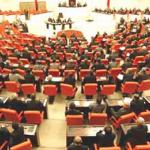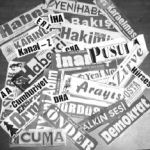The two day meeting hosted presentations by BIA legal advisor Fikret Ilkiz on the new Turkish Penal Code (TCK) and the Radio and Television Supreme Council (RTUK) legislation and practices as well as a series of discussions on various issues including articles 301, 277, 288 of the Turkish Penal Code, article 19 of the Press Law and the 4th article on publishing principles as described in Law 3984.
Tunceli Bar Association lawyer Huseyin Aygun conducted a presentation on the problems Turkey's new Anti-Terror Law would present to defence and fair trial rights.
Law workshop attracts 32 jurists from 15 cities
A total of 32 jurists from 15 cities attended the two day program where practical workshops based on current news items were held in groups of four. The jurists were from Istanbul, Ankara, Izmir, Diyarbakir, Van, Antalya, Batman, Canakkale, Eskisehir, Sanliurfa, Samsun, Bursa, Zonguldak, Mugla and Mersin provinces.
Following an opening speech made by BIA² Project Consultant and IPS Communication Foundation Executive Board chair Nadire Mater, Project Coordinator Ertugrul Kurkcu introduced the participants to the BIA² project. After these speakers, lawyer Meric Eyuboglu covered the schedule of the program for the two days.
Jurists discuss TCK, RTUK and TMY
Titles of the issues covered by communications jurist Fikret Ilkiz were "Freedom of Expression under the light of the TCK", "Press Crimes under the light of TCK", "Insult under the light of TCK", "Crimes against the state under the light of TCK" and "Practices of the RTUK".
Ilkiz opened to discussion a series of contemporary issues in light of current legislation including the "insult" suit filed against writer Yakup Onal by the Sarkkoy court for his article titled "Pinocchio and the nine dwarfs" published in the Sarkkoy'un Sesi (Voice of Sarkkoy) newspaper, the case filed against eight journalists in Kutahya for their criticism of the State Council 2nd Chamber decision related to a teacher wearing a headscarf, the broadcast ban imposed on televisions by the Malatya Criminal Court of Peace related to violence and Children Homes, the news report titled "Fans of the Chief" related to Seday Peker which was published in the Milliyet newspaper on July 5, 2005 and the seizure of the Birgun newspaper for its news report on the Spice Market bombing.
Article 125 of the Penal Code titled "Insult", article 132 on "Violation of the confidentiality of communication", article 133 titled "Listening on and recording communication between individuals", article 134 on "Violation of confidentiality of private life", article 277 on "Influencing people on trial duty", article 288 on "Attempt to influence fair trial" and article 301 covering "Degrading the concept of being a Turk, the republic, the institutions and organs of the state".
Ilkiz: EU Advisory Decision is an important resource
While discussing the issue of news coverage of criminal court cases, lawyer Ilkiz stressed that the July 10, 2003 advisory decision of the European Council Ministers Committee related to "giving news on criminal prosecution through the media" was an important resource for jurists.
Ilkiz recalled that the most recent European Union Progress Report covering developments until September 30, 2005 contained many examples of cases launched against journalists and others under article 288 . He said that a backward step taken with a recent amendment on increasing penalties for this crime committed by way of press and media made no change in the essence of the article.
While talking about examples, Ilkiz referred to past decisions of the European Court of Human Rights (ECHR) such as the Perna/Italy verdict, the Sunday Times/ United Kingdom verdict, the Weber/Switzerland verdict and the Goodwin/United Kingdom verdict.
"Frequencies on rent but no planning "
Explaining that the impartiality of the Radio and Television Supreme Council (RTUK) has for a long time been debated on the public agenda, lawyer Ilkiz said the Council had become a platform where its members were elected by the government and opposition. He gave examples of the operations during news casts and in other casts.
Saying that radio and television companies were paying rent for the frequency they were using, Ilkiz added that Turkey lacked a comprehensive frequency planning and that this led to various judicial problems.
Tumer: RTUK ignored court decision
Lawyer Meric Tumer who participated in the workshop from Adana recalled that in their region a three year broadcast ban had been imposed on a radio for broadcasting in the Kurdish language and various other claims including "inciting hatred and enmity". He said these were appealed against and that all but one case was won favourably.
Tumer said he had come across a case where it was alleged a radio was creating interference and that they were acquitted in the case despite it being a difficult one.
He said that both officials and the RTUK had started proceedings including bringing charges against a radio station for issuing an appeal to attend a meeting to mark September 1 Peace Day that was later cancelled but that although the case itself had resulted with an acquittal decision, the RTUK ignored this decision and did not withdraw its own decision.
Aygun: TMY draft an obstacle to fair trial
Lawyer Huseyin Aygun who made a small presentation on the controversial Anti-Terror Law (TMY) draft that is debated at parliament explained that the draft restricted defense rights and that lawyers accused under the scope of "terror offences" could be barred from duty for 6 months to 2 years.
Aygun said the draft contained important restrictions on the right to defence and access to family and attorney and, referring to article 250 of the Criminal Procedures Law, he explained that at times they needed to travel 500 kilometers to attend special courts created to handle terror crimes.
According to article 250 such offences are heard at High Criminal Courts that are determined by the Supreme Board of Judges and Prosecutors on recommendation from the Ministry of Justice and are based in a province that will encompass many provinces.
İlk gun ve ikinci gunun ogleden sonraki oturumlarinda dört grup halinde, güncel haberlerden hareketle uygulamalı atölye çalışmaları da yapıldı.
Atölyelerde, Türkiye'de güncel konulara ilişkin basından çıkan haberlerden hareketle, "TCK ışığında basın suçları", "TCK ışığında hakaret suçu" ve "TCK'da yargıyı etkileme" konuları tartışıldı.
Atölyede gruplar, bu örnek vakalar üzerinden yargıya başvuru için örnek dilekçeler üzerine çalıştı. Atölye çalışmalarının sonunda her bir grup, kendi çalışma sonuçlarını tüm katılımcılarla paylaştı ve tartıştı.
BİA² had held the first of these programs where lawyers working in the field of freedom of expression were invited in September 2004.
BİA² was implemented by the IPS Communications Foundation in 2003 and is a 36 month project overseen by the project coordination headed by project advisor Nadire Mater and project coordinator Ertuğrul Kürkçü. 80% of the project's budget is met through a grant contract under the European Union's Initiative for Democracy and Human Rights (EIDHR). (EO/II/YE)














